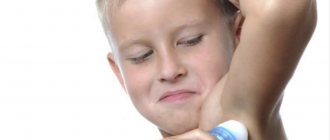Children tend to urinate more frequently than adults because children drink more water relative to their body weight and children have smaller bladders. In addition, children cannot restrain the urge for long enough, since it takes a long time - several years - to fully develop urinary control.
If it hurts your child to pee, his urinary tract may be inflamed; Other reasons are also likely. Urinary tract infections are more common in girls than in boys. Sometimes inflammation of the urinary tract (especially in boys) occurs due to a congenital obstruction to the outflow of urine.
THE DOCTOR'S CONSULTATION
Contact your child's doctor immediately if:
- the child does not pass urine
- you found blood in your urine
- The child has an enlarged abdomen and urine is difficult to pass
- Your child's urination is painful or unusually frequent
- unpleasant smell of urine
- enuresis suddenly appears after a dry period
ATTENTION!
Sometimes, if urinary tract infections are repeated frequently, the child may begin to hold back urination - then it will be rare. Teach your child, if possible, to go to the toilet immediately when the urge occurs.
| ASK YOURSELF A QUESTION | POSSIBLE REASON | WHAT TO DO |
| Does your child have frequent, painful urination, a burning sensation, pain in the lower back and abdomen, or an unpleasant smell of urine? Are you experiencing urinary incontinence because the urge is very strong? Increased temperature? | Urinary tract infection | You need to consult a pediatrician and take a urine test |
| Is your urine cloudy with an unpleasant odor? Is your temperature elevated? | Urinary tract infection | An examination and consultation with a pediatrician and urine tests |
| Does the girl have vaginal discharge or redness of the genitals? Complaints of burning or pain in the genital area? | Vulvovaginitis or foreign body in the genital tract | It is necessary to go to an appointment with a pediatrician (or a gynecologist ) to examine and remove the foreign body from the vagina. Vulvovaginitis requires treatment. |
| Does the boy have difficulty urinating, is the tip of the penis swollen and painful? | Narrowing of the urethral outlet, inflammation of the glans penis (balanitis) | Consult a pediatrician and prescribe treatment or examination |
| Does the girl have a burning sensation in the vaginal area and difficulty urinating? | Synechia (fusion of the labia) | It is necessary to consult a pediatrician and prescribe treatment after examination. |
| Does your child have a burning sensation when urinating after taking a bath? | Getting detergent (soap, shower gel) into the genitals or urethra | Advise your child to rinse thoroughly with water after a bath and not to rub the genitals with soap/gel, but to lather his hands. |
| Does your child have swelling in the side of the abdomen? Is there vomiting and/or pain when urinating, is there blood in the urine, is urination difficult? | Immediate diagnosis and treatment of this disease is required | Call your pediatrician immediately ; hospitalization may be required. |
FOR INFORMATION
Prevention of urinary tract infections
If urination is painful, the most common cause is a urinary tract infection. Girls are especially susceptible to such infections because their urethra is very short and germs from the rectum easily pass through it into the bladder. Girls should wash themselves after each bowel movement, from front to back. From an early age, both girls and boys should be taught to carefully maintain personal hygiene.
For urinary tract infections, a common home remedy is lingonberry or cranberry infusion. These decoctions make the urine more acidic, which inhibits the growth of bacteria. Equally effective is drinking plenty of plain water, which washes away germs.
To prevent urinary tract infections it is recommended:
- Wear cotton underwear and avoid clothes that are too tight
- Do not use bath products that may irritate the genitals and urethra
- After swimming, change into dry underwear and do not sit in a wet bathing suit
- Avoid eating foods and drinks that can irritate your bladder. These include: Coca-Cola, chocolate, some spices
Pediatrician appointment prices:
| Appointment (examination, consultation) with a pediatrician (1 hour) | 1950 |
| Examination of a child by a pediatrician to obtain a certificate + certificate | 1750 |
| Appointment (examination, consultation) with a pediatrician of the first category, head. department Barzenok T.A. | 2850 |
| Registration of a certificate | 700 |
| Appointment (examination, consultation) with a leading pediatrician (Sedova M.S.) | 2500 |
| Appointment (examination, consultation) with a pediatrician, head of the breastfeeding support department, Kazakova L.V. | 2850 |
| Appointment (examination, consultation) with a pediatrician (Premium category) (Sergienko T.Ya.) | 4000 |
| Visit of a pediatrician, consultation at home (Moscow) | 4250 |
| Consultation with a pediatrician at home for the second child | 1950 |
| Visit to the home of a pediatrician, head of the breastfeeding department, Kazakova L.V. | 4250 |
The main causes of the disease
Unpleasant irritation in the intimate area of a child, redness, itching in a girl most often serves as an example of a specific skin reaction. At the same time, the vaginal area begins to itch, causing a strong desire to scratch the painful manifestations. This phenomenon most often occurs in girls at the age of 12, but there are many examples when it appeared earlier.
Many teenagers with itching sensations in the intimate area silently endure all painful manifestations, without telling adults about it. This is completely wrong, since sometimes these manifestations serve as symptoms of dangerous diseases. Therefore, at the first itching sensation in the groin, girls should inform their parents.
Redness in the groin, as well as unbearable itching, is caused by:
- Fungus. Itchy manifestations in most cases torment children whose bodies have been penetrated by athlete's foot spores.
- Inflammation. Very often, itching in the intimate area in girls is associated with the development of inflammatory processes inside the skin. Typically, such inflammations begin as a result of the penetration of bacterial pathogens into the child’s body.
- Contact type of dermatitis. When a child bathes in a public pond, there is a high risk of contracting dermatitis. The latter often causes itchy skin in the groin.
- Scabies. Redness in the intimate area may be associated with damage to the child's body by pubic lice or scabies. In this case, children should be accompanied by an adult to visit the office of a pediatrician or dermatologist.
- Infectious nature of diseases of the genitourinary organs. Regardless of how old the child is, his genitourinary system may be exposed to the pathogenic effects of certain factors. The latter often initiate the appearance of unpleasant itching in the groin area.
- Allergy. Very often, redness appears in the child’s groin, which is caused by the development of corresponding allergic reactions. Allergies can be caused not only by ignoring personal hygiene standards, but also by the composition of many hygiene products.
- Medicine. Certain types of medications, when used frequently, lead to redness in the child's groin. Especially if the baby is “stuffed” with antibacterial drugs that kill many types of beneficial bacteria in the microflora.
Regardless of the cause of discomfort in the groin area, girls should be subjected to mandatory treatment as early as possible. It is carried out only by a doctor after finding out the true causes of discomfort in the groin. By the way, there are many reasons for the development of this unpleasant phenomenon, but treatment should always be targeted at the source of pain.
Pediatricians:
Avzalova Daria Evgenevna
Pediatrician, infectious disease specialist
Experience: 16 years Reviews: 6
Call to home
Barzenok Tatyana Arsenyevna
Head of the pediatric department, pediatrician of the first category
Experience: 26 years Reviews: 16
Make an appointment Call at home
Belousova Elena Sergeevna
Pediatrician, nephrologist
Experience: 16 years Reviews: 14
Make an appointment Call at home
Bykov Mikhail Viktorovich
Pediatrician of the highest category, ultrasound diagnostics specialist, Candidate of Medical Sciences
Experience: 23 years Reviews: 3
Make an appointment Call at home
Kazakova Liliya Valentinovna
Pediatrician, neonatologist, head of the breastfeeding consultant service
Experience: 26 years Reviews: 30
Make an appointment Call at home
Sedova Maria Sergeevna
Pediatrician, allergist-immunologist
Experience: 18 years Reviews: 28
Make an appointment Call at home
Sergienko Tatyana Yakovlevna
Pediatrician, pediatrician on duty at the pediatric hotline
Experience: 37 years Reviews: 21
Make an appointment
Mothers can encounter problems with urination in their baby at any time and should be able to determine the cause in time. Firstly, this may only be the “tip of the iceberg”, and secondly, the baby is in pain and this can provoke a number of other difficulties such as fear of the potty.
Why does it hurt for a child to write?
As a rule, you have to deal with various types of hypothermia. But, unfortunately, this is far from the only reason for painful urination in a child. In each case, in addition to the painful process of urination, you will find some typical signs of one or another malfunction in the child’s body.
- Pay attention to whether the urine has a characteristic unpleasant odor, how often the baby runs to the toilet or potty. It is possible that you are dealing with an infectious disease. This may result in fever and sometimes urinary incontinence. In this case, you need to contact your pediatrician and take a urine test to confirm your concerns.
- Pain when urinating in a child may be accompanied not only by an unpleasant odor, but also by the uncharacteristic cloudy contents of the potty. This may also indicate a urinary tract infection.
- Pain when urinating in children sometimes occurs after soap or other detergent gets into the genitals or urethra. Your task is to teach your child to rinse off the soap thoroughly and not to apply the product directly to the genitals, but to pour it first onto his hands.
- If it hurts your child to pee and you notice a slight swelling on the side of the abdomen, immediately contact a specialist. Difficulty urinating or the red color of the urine itself should also alert you. This may be a signal of urolithiasis.
- It may be painful for the child to pee due to a foreign body getting into the urethra.
- And the most dangerous moment is when your child holds his lower back while urinating, explaining this as pain. This is a sign of vesicopelvic reflux, when urine enters the kidney directly from the bladder.
It hurts to write to a girl
- Pay attention to the condition of the child's genitals. If you find redness or discharge, these may be signs of vulvovaginitis or a foreign body in the genital tract. In this case, the child may complain of a burning sensation or pain in the genital area. You need to see a specialist as soon as possible so that he can remove the foreign body, take tests and prescribe treatment.
- It hurts for a girl to write with synechiae. With such fusion of the labia, a burning sensation in the genital area is also observed, the child will constantly hold on to the sore spot and be afraid to sit on the potty.
- The third option for the cause of pain during urination is an inflammatory process of the vaginal lining. Characteristic symptoms are also white vaginal discharge, constant itching and redness. You can temporarily alleviate the child’s condition with a warm chamomile bath, but you should not hesitate to visit a pediatric gynecologist.
It hurts the boy to write
The first thing to do if it is painful for a child (boy) to pee is to examine his external genitalia. If the tip of the penis is clearly swollen, has a reddish color and hurts when touched, you are most likely dealing with balanitis. This is a narrowing of the outlet of the urethra and inflammation of the head of the penis.
With such inflammation, pain when urinating in children will be accompanied by itching, swelling and purulent discharge. In some cases, when you palpate the inguinal nodes, you will notice their enlargement. Before going to a specialist, you can also alleviate the child’s condition with chamomile baths.
Pain when urinating in men
The cause of pain when urinating in men can be:
- presence of inflammation of the urinary system;
- the presence of sexually transmitted diseases : chlamydia, in which the entire genitourinary system is affected by chlamydia; trichomoniasis, characterized by damage to the prostate; Gonorrhea is a disease that affects the urethra. Almost all sexually transmitted diseases are accompanied by pain when urinating, and this symptom does not appear at the initial stage of the disease, so it is necessary to consult a doctor as soon as possible;
- the presence of urolithiasis . When a stone comes out, its size may not coincide in width with the ureter, as a result of which its edges may begin to cut the mucous membrane. In this case, the pain is very strong and is of a point nature;
- the presence of an infectious-inflammatory process with urethritis . Pain usually occurs at the beginning of the urination process. In this case, the pain should be treated immediately, before the infection has time to rise higher and affect other organs;
- if pain occurs after sexual intercourse - infection with sexually transmitted diseases from a partner or abstinence for a long time;
- presence of prostatitis . In this case, in addition to the pain during urination, a burning sensation occurs in the urethra, which can appear either at the beginning of the process, or at the end, or persist throughout the entire process of urination;
- the presence of opportunistic flora , as a result of which thrush occurs. The cause of the disease may be taking antibacterial drugs, hypothermia, weakened immunity;
- the presence of intestinal pathologies when pain occurs at night during urination;
- the occurrence of chemical irritation , which can be caused by an allergic reaction to modern products intended for intimate hygiene, the use of bath salts, and the use of soap.

Diseases of the genital organs in boys
Balanoposthitis in boys
Balanoposthitis foreskin . The cause of this disease is as follows: many boys have adhesions (synechia) between the skin of the glans penis and the inner surface of the foreskin. The glands located in this area synthesize a lubricant called smegma. Usually a small amount is released. During hygiene procedures, smegma is washed off with water. However, in the presence of synechiae, smegma may accumulate in the form of white islands that are visible through the skin (smegmoliths). They have a curdled structure and are a rich nutrient medium for various microorganisms. When microbes enter this area, suppuration is possible and, as a result, swelling of the foreskin. Treatment of balanoposthitis is conservative (non-operative). Sometimes it is enough to take baths with a weak solution of potassium permanganate for several days (the solution should be pale pink). In other cases, hydropreparation is performed - injection of a furatsilin solution under the skin of the foreskin. In this case, the destruction of adhesions and the opening of ulcers occurs. After 2-3 weeks, a re-examination is necessary and, if necessary, tracing the synechiae using a button probe.
Video: How to treat inflammation of the foreskin in a child?
Phimosis in boys
Phimosis is the failure to open the head of the penis due to narrowing of the foreskin.
Hypertrophic phimosis is characterized by an excess of foreskin. With atrophic phimosis, there is little skin in this area and it has scarring changes. Surgeons also distinguish physiological (normal) phimosis, which goes away on its own. Until now, there is debate among doctors about the age and timing of the disappearance of physiological phimosis (from 2-3 years to 7 years). The timing and extent of surgical treatment are determined only by the pediatric surgeon.
Video: Phimosis in a boy: normal or pathological?
Cryptorchidism in boys
Cryptorchidism is the failure of one or both testicles to descend into the scrotum. The disease is diagnosed in the maternity hospital. After discharge, the child is observed by a surgeon and, if necessary, by an endocrinologist. Planned surgical treatment is currently carried out at the age of 1 to 3 years. Surgery for cryptorchidism is necessary, since the undescended testicle is in unfavorable conditions. Normally, the temperature inside the scrotum is 1 - 1.5 degrees lower than body temperature, which is a condition for the normal functioning of the testicle. When the temperature balance is disturbed, cells die and are replaced by connective tissue. An undescended testicle is more susceptible to various injuries, the possibility of torsion and degeneration into a malignant tumor - the testicle. It is necessary to distinguish between the forms of cryptorchidism - inguinal (retention of the testicle in the inguinal canal) and abdominal (retention of the testicle in the abdominal cavity). In addition, there is false cryptorchidism, in which the testicle is strongly pulled up and descends in rare cases. In order to distinguish a true undescended testicle from a false one, it is enough to lower the testicle into the scrotum with warm hands in the presence of the parents. False cryptorchidism is considered a normal variant and does not require any treatment. An anomaly in the location of the testicle that requires surgical intervention is its ectopia. In this condition, the testicle is either under the skin or under the superficial fascia. Children with testicular ectopia require surgical intervention.
Swollen scrotum syndrome
Swollen scrotum syndrome is a complex of pathological conditions united by one concept. This syndrome includes the following diseases: hydrocele; testicular torsion; torsion of the testicular hydatid; various injuries associated with testicular damage; inflammatory processes (orchitis).
- Torsion is a pathology in which the testicle makes one or more revolutions around its axis. In this case, torsion and compression of the vessels feeding it occur. The disease requires immediate surgical intervention. There is no alternative to surgery, and if it is not done in a timely manner, the testicle will die.
- Hydatid torsion is a torsion of the fatty suspensory testis (hydatid of Morgagni). Not all males have fat deposits ranging from 1 to 6. The disease has an abrupt onset - sudden severe pain occurs in one of the halves of the scrotum, followed by swelling. This acute situation requires surgical treatment. If the operation was not performed, the testicle may lose from 40 to 60% of its function due to the development of scar changes.
- For injuries that are accompanied by enlargement of one or both halves of the scrotum as a result of accumulation of blood or swelling, the child must be shown to a surgeon to decide on surgical or conservative treatment.
- Inflammation of the testicle (orchitis) and inflammation of the epididymis (orchiepididymitis) are characterized by a relatively gradual onset and usually occur after hypothermia or injury. If the diagnosis is correct, the disease does not require surgical intervention; treatment is carried out with antibiotics and uroseptics - drugs that sanitize the urinary tract.
Mizerny I.V., pediatric surgeon
It hurts for a girl to write: causes and treatment. Why does it hurt for a girl to write?
Many parents face problems and pain when urinating in their children. This process occurs more often in children than in adults. For example, newborn babies pee more than 5 times a day. Children aged 12 months already go to the toilet up to 15 times a day - this is considered the norm.
If it hurts a girl to pee, there is a possibility that her urinary tract is inflamed. Infections of the genital organs in girls are much more common than in boys - this is due to physiological characteristics. The urethra in girls is short, and infection from the rectum can easily pass through it into the bladder.
Various types of hypothermia, poor nutrition, poor hygiene and many other reasons can cause diseases accompanied by pain when urinating. It is possible to understand why it hurts for a girl to write only after diagnosis.
Why does pain occur?
The main causes of pain when urinating in children:
- Infectious diseases of the urinary system.
- Presence of kidney stones.
- Vesicopelvic reflux.
Sometimes pain during urination is possible when soap solution gets on the genitals or in the urethra. It irritates the mucous membrane and can cause discomfort. It is necessary to teach your child to rinse off all products well.
Infections can cause inflammation of the renal pelvis, bladder, and urethra. Children with this disease experience discomfort when urinating: pain, stinging, burning.
In addition, there may be an increase in temperature, general weakening of the body, loss of appetite, insomnia, vomiting, and abdominal pain.
Urine may be released frequently, but in small quantities, have a strong unpleasant odor and may contain blood.
If a child complains of pain when urinating, you need to pay attention to the color of urine, volume, and impurities.
Cystitis
Cystitis in girls is one of the most common diseases of the urinary system. In boys, the disease is diagnosed 3 times less often than in girls. Most often, the disease is found in children aged three to twelve years. In some cases, urinary incontinence occurs.
Forms of cystitis
Cystitis can have an acute or chronic form. In the acute form, symptoms appear suddenly. The development of cystitis can be stimulated by decreased immunity, hypothermia or other factors.
The main manifestations of the acute form:
- Dysuria (frequent urge to urinate).
- Sharp pain in the urinary canal area.
- Presence of pus or drops of blood in the urine.
Cystitis is accompanied by an inflammatory process in the bladder. The stronger the inflammation, the more often the urge to urinate. If it hurts a girl to write and drops of blood are released, this means the presence of an inflammatory process. In the acute form of this disease, the urge to urinate is very frequent, every 20-30 minutes.
Chronic cystitis occurs as complications of diseases of the bladder, kidneys, and genital organs. All symptoms in this form are the same as in the acute form. To treat chronic cystitis, accurate diagnosis of diseases is necessary.
Urolithiasis disease
If it hurts a girl to write and a slight swelling is felt on the side of her abdomen, this may be a signal of urolithiasis. In this case, you should immediately consult a doctor.
Urolithiasis is accompanied by difficulty urinating and reddish color of urine. In addition, acute colic in the abdomen may occur. Stones appear in the genitourinary system; when going to the toilet, they begin to put pressure on the neck of the bladder.
In some cases, the composition of urine may change, and an admixture of sand and salt may appear.
Vulvovaginitis
When it hurts a girl to pee, you need to pay attention to the condition of the child’s labia. If there is redness on the mucous membrane, discharge with an unpleasant odor, there is a possibility of developing vulvovaginitis or the presence of a foreign body in the urethra. Colic begins in the lumbar region, then moves to the bladder and genitals.
With vulvovaginitis, it hurts for a girl to write. What to do in this case? Complex therapy is required. In girls under 10 years of age, the genitals are highly susceptible to inflammatory processes.
In case of severe manifestations of the disease and frequent relapses, it is necessary to sanitize the genital organs, increase immunity, and prescribe the use of vitamins and immunostimulants. Treatment is carried out in stages.
In some cases, a course of antibiotics is prescribed.
A proven remedy - chamomile bath
With the inflammatory process of the vaginal lining, painful sensations appear during urination. The main symptom is white discharge. The disease is also accompanied by itching and redness of the mucous membrane. For inflammation of the vagina, a chamomile bath helps a lot. If you have symptoms, you should immediately contact your pediatric gynecologist.
Diagnostics
If pain occurs when urinating, it is necessary to diagnose the child. It hurts to write to a girl with vesicopelvic reflux. In this disease, urine flows from the bladder into the renal pelvis.
Vesicopelvic reflux is very common in children. If it hurts to write to a girl (3 years old), but urination is free, this may be symptoms of reflux.
After urination, the pain goes away, after a short time the urge to urinate appears again and a small amount of urine comes out.
The pain can be either aching or cramping. Symptoms of reflux include bitterness in the mouth, lack of appetite, burning sensation in the chest, and anxiety. Sometimes a girl (2 years old) complains: “It hurts to write.” What to do with vesicopelvic reflux? In this case, you need to contact a specialist for a thorough examination.
Who to contact?
It is necessary to consult a specialist if it hurts your child to write. The girl needs to be diagnosed with the disease and prescribed the correct treatment. These problems are dealt with by doctors: pediatricians, urologists, gynecologists, nephrologists.
A thorough external examination is required. It is very important to conduct a diagnosis if it hurts a girl to write. What to do in this case? Next, they study the medical history and take a smear to check for infections. It is necessary to take a urine test and culture it to ensure sterility.
Cystoscopy may be performed.
It is very important not to delay taking medications; you should immediately consult a doctor. There is no need to self-medicate. A negligent attitude to such a serious problem can lead to disastrous consequences. Getting rid of a disease at an early stage is much easier than treating a disease in an advanced form.
Source: https://fb.ru/article/169532/devochke-bolno-pisat-prichinyi-i-lechenie-pochemu-devochke-bolno-pisat
If there's something wrong with the boy
- Does the boy's scrotum hurt?
- Does he have a painless swelling inside his scrotum?
- Perhaps this is an inguinal hernia
, that is, part of the intestine has descended into the scrotum through a weak area of the abdominal wall. An inguinal hernia can cause a cyst (a sac filled with fluid) to form or fluid to accumulate in the scrotum itself. - Does your penis only hurt when you urinate?
- This may be a consequence of inflammation of the urinary tract
. - Did he have any trauma to his genitals?
- Or maybe the boy just had mumps?
- Unexplained pain and swelling may be caused by testicular torsion
(turning of the testicle inside the scrotum). - If the pain does not subside after an injury to the genital area, it may be a closed testicular injury
. - In this case, he may have orchitis
(inflammation of the testicles: a common complication after mumps). This disease is less common in young children and more common in adolescents. - Is the tip of his penis painful?
- The child may have balanitis
(inflammation of the skin of the glans penis). It is caused by friction with wet underwear or by excessive and improper washing. - If you do not pay attention to balanitis, the disease can result in narrowing of the foreskin
(phimosis). The fact is that the foreskin (a piece of skin covering the head of the penis) normally does not retract in the first years of life. Don't try this while giving your baby a bath. As the child grows up, the foreskin becomes more mobile and, accordingly, easier to retract. But against the background of relapses of balanitis, scarring of the foreskin may occur, and it will remain narrowed, greatly complicating a normal erection in the future. - Did you notice any discharge from the penis (stains on panties) and did the boy complain of pain when urinating?
-
there is
most likely a foreign body
in the urethra . It happens that small children push beads, chips, and coins there. If they do not pass out along with the urine, inflammation occurs, accompanied by a grayish-yellow discharge. - If the discharge is profuse and has a greenish tint, the boy may have gonococcal urethritis.
- At this point, put the “walker” aside and go with the boy to the doctor.
Your actions
: Consult a doctor. If the diagnosis is confirmed, the child will undergo surgery.
Your actions
: Consult a doctor. First of all, he will ask you to submit your urine for analysis. If inflammation of the urinary tract is detected, the doctor will likely prescribe a course of antibiotics. During treatment, the child is advised to drink plenty of fluids.
Your actions
: the child requires hospitalization.
Your actions
: we need to go to the hospital, where the boy will be thoroughly examined and, perhaps, operated on.
Your actions
: Show your child to the doctor. He will likely prescribe painkillers and anti-inflammatory medications.
Your actions
: if the diagnosis is confirmed, the doctor will most likely prescribe an ointment for topical use and recommend adding a weak antiseptic to the water when bathing the child. While the skin is inflamed, you should not wash your penis with soap.
Your actions
: Consult a doctor. If there is a foreign body in the urethra, minor surgery may be required.
Your actions
: First, be sure to show your child to the doctor. Gonococcal urethritis requires drug treatment. Secondly, exclude the household route of infection (shared towel, washcloth, soap).










